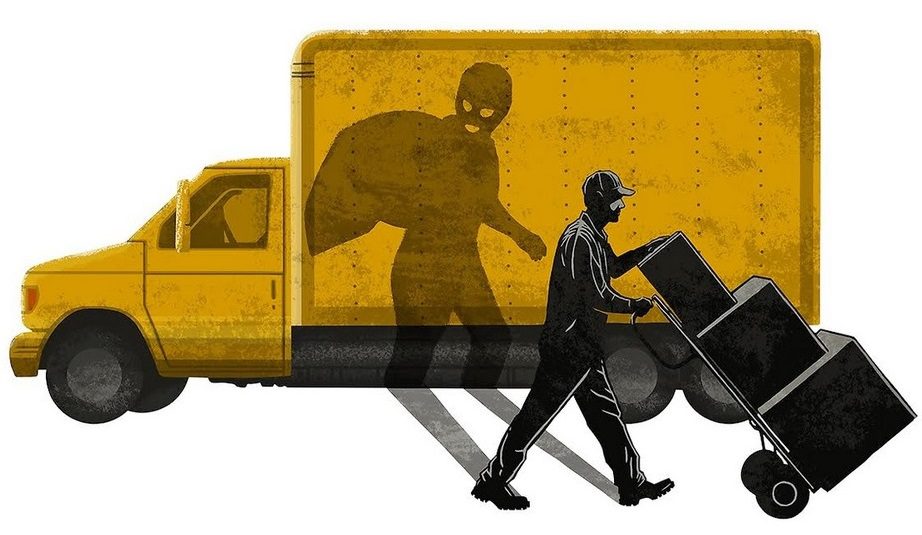
Oct
Many of us have had a difficult year, but New Jersey moving company fraudsters have not had a bad year. A pandemic, a booming housing market, and other natural calamities have created numerous possibilities for shady movers to prey on people.
Take California as an illustration. In comparison to the same period in 2019, the Department of Consumer Affairs received more than twice as many complaints about movers between March and December of 2020.

But do not fret. It’s not all bad news, either. There are easy ways to avoid New Jersey moving company scams and make sure you’re working with a trustworthy provider if you’re intending to relocate this year. The key to avoiding scammers is to be alert for warning signs:
Let’s first discuss some of the most common methods that individuals are being conned these days before going through some of the big red flags in more depth below.
COMMON NEW JERSEY MOVING COMPANY SCAMS CONSIST OF:
False New Jersey moving companies who receive your money but fail to carry out the move. On occasion, they’ll even take everything you own in the process.
Companies that demand outrageous payments for phony services before releasing your belongings.
The traditional “bait-and-switch” occurs when a business offers you a ridiculously low estimate to win your business, only to overpay you after the product is delivered.
Utilizing a well-known, reliable firm, such as White Glove Moving and Storage, is one of the simplest methods to prevent these frauds from the start. However, if you do decide to hire a mover you aren’t previously familiar with, watch out for the following warning signs.
REQUIRING A LARGE DEPOSIT OR CASH PAYMENT UPFRONT
Similar to tipping, not everyone understands when a deposit is appropriate or not. But don’t worry—in the majority of cases, reputable movers won’t ask for a deposit when scheduling your move. (By the way, tipping your NJ movers is greatly appreciated but not necessary.)

There may be circumstances where a deposit is required for a valid purpose. Some movers may want a small fee to hold the date of the move during busy periods (such as the summer months) and in high-volume locations to prevent their calendar from filling up too quickly.
However, if your New Jersey moving company requests payment in advance, that may be a symptom of one of the many moving company frauds that exist. Following up with inquiries like “What is the deposit for?” and “Is making a deposit normal practice for your company?” is advisable.
It might be okay if your New Jersey moving company can satisfactorily respond to those inquiries, but you should nonetheless proceed with care.
A SITE-UNSEEN QUOTE
It can be challenging to predict how much stuff will fit in your car if you’ve ever tried to load it for a quick trip. Since packing up everything you own and loading it onto a moving truck amounts to the same thing, times roughly 1,000, many traditional New Jersey moving company prefer to provide in-home estimates.

Make sure to acquire a legitimate, in-home estimate as this is one of the greatest methods to avoid New Jersey moving scams. You get to meet your mover in person, ask those questions, and confirm that the estimate you’re receiving is accurate.
Based on the size of your property and the distance you’re relocating, some reliable New Jersey movers might be able to give you a rough estimate of your moving costs, but this is significantly different from an actual quote or contract.
Good movers are aware that without being in the room, it is impossible to determine the precise size and weight of your belongings.
In-home quotes can be challenging during a pandemic, but there may be socially isolating options available, like a virtual tour. In any event, you shouldn’t believe any quote you receive over the phone.
MOVING QUOTES THAT SEEMS SUSPICIOUSLY LOW
Something is probably genuine if it looks too good to be true. If a Nigerian prince emails you and offers to give you his riches, it’s probably a scam. And if a business gives you an estimate for moving costs that is incredibly low, it can be a bait-and-switch moving scam.
The bait-and-switch con involves receiving a low quote up front, but the business subsequently demands a high amount upon delivery. The movers will next assert that they were unaware of your extensive possessions or that the transfer took longer than anticipated.

Other red flags of a potential bait-and-switch are as follows:
1. Instead of charging by weight, the mover prefers to charge by cubic feet.
2. The papers or a firm estimate from your mover are difficult to obtain.
3. The mover claims they’ll calculate the cost once they’ve loaded everything.
Check the customer ratings and corporate accreditation if your initial quotation does appear to be too low, and think about getting a second quote from a different provider before moving forward.
What should the real cost of your move be?
Without actually viewing your goods, it’s impossible to provide a quote that is correct. However, there are specific price bands where typical moves tend to fall. Here are some rough estimates for long-distance relocation using three different service types: rental trucks, moving containers, and full-service movers.
NOT SHOWN IN THE FMCSA DATABASE AS A LICENSED MOVER
If a restaurant hadn’t recently undergone a health department inspection and been given the all-clear, wouldn’t you avoid it? The Federal Motor Carrier Safety Administration (FMCSA) is sort of like the health department for the moving business, so if your mover isn’t on their list, it’s probably time to look for another one.
On the FMCSA website, you can look up licensed movers using their USDOT number, MC/MX number, or name. The USDOT number should be listed on the
NJ mover’s website, or you can phone and ask them for it.
One thing to be on the lookout for is a business that alters its name or is ambiguous about it.
It’s a warning sign if the NJ moving company you’re working with answers the phone with the phrase “moving company” or “New Jersey movers.” Some fraudulent moving businesses will frequently change their names in an effort to avoid receiving a poor rating from the Better Business Bureau or FMCSA licensure.
GETTING A TON OF UNFAVORABLE CUSTOMER REVIEWS
Let’s be clear about this: Online reviews for New Jersey moving company can be negative, even for excellent, registered movers. Because people rarely take the time to critique something unless they are upset, online reviews frequently skew negative.

However, reputable customer reviews (as opposed to those that the business boasts about on its own website) can help you find some useful information. Look for reviews on independent websites that include details rather than just a star rating, such as the date of the relocation, the problem(s), and the company’s response.
If numerous evaluations point to the same shady experience, you can interpret this as a valid warning of a potential con. This doesn’t necessary imply that you shouldn’t use the business, but it does suggest that you follow up and keep an eye out for issues.
No reviews at all are another warning sign. Avoid a NJ mover if there are no reviews for it.
ASKING YOU TO SIGN FORMAL DOCUMENTS OR BLANK CONTRACTS
No one reads the small print on the items they sign or the boxes they check, am I correct? Well, you might want to take a few additional minutes when you’re paying thousands of dollars to have people move your priceless possessions across the nation.
Your contract, which is also known as an “order for service,” is the only thing that can shield you from the numerous shifting frauds. The company’s name, address, and the services being rendered, as well as the agreed-upon expenses, fees, and insurance policies, should all be clearly stated in your contract’s straightforward language.
DO NOT SIGN YOUR CONTRACT IF ANY OF THIS INFORMATION IS MISSING OR IF SECTIONS ARE LEFT BLUE!
It can be challenging, especially if a NJ mover advises you that signing the contract and filling it out later is “normal,” but it’s crucial to avoid being overcharged.
MAKE COMMUNICATION DIFFICULT
New Jersey moving companies can present themselves as being too busy to speak with you or respond to your inquiries. However, the fact remains that if you are paying for a service, you have a right to know what is going on.
Therefore, if your NJ mover seems reticent to respond to inquiries or if they are difficult to reach, consider it a huge warning sign.
By just having regular, cordial conversations with your movers regarding the services they offer and the charges involved with them, you may stop many moving frauds in their tracks.
EXTRA LATE? HOW TO REPORT A SCAMMER IS HERE.
You shouldn’t encounter any issues if you watch out for the warning signs listed above. But what should you do if a New Jersey moving company has conned you?
The first step is to confirm that you are genuinely dealing with a fraud and not just a minor error.
There are situations when New Jersey movers will inadvertently damage an item, tack on a few unforeseen costs (like tolls), or become delayed for a valid reason. These are hardly grounds to complain about the business (although they may be reasons to leave a not-so-glowing review).
But here are some actions you can take if your belongings are being held hostage, you’re being grossly overcharged, or the New Jersey moving company has abruptly modified the terms of your contract:
• Send a complaint to the moving business directly.
• Make a complaint to the American Moving and Storage Association, the FMCSA, or the Better Business Bureau.
• When everything else fails, hire a lawyer and file a lawsuit against the business.
• Often, merely threatening to take the aforementioned steps will help your matter be resolved.
Do you believe the red flag tests were passed by your top candidate for a New Jersey moving company? We hope so!
